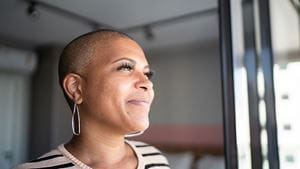
In August 2023, a study was published in JAMA Network that looked at more than 562,000 early-onset cancer patients to determine any patterns that emerged.
Many news stories about the study focused on the data suggesting more young women, particularly between ages 40-49, were being diagnosed with breast cancer compared to years before.
Kelly Krupa, MD, a breast surgical oncologist at Rochester Regional Health Breast Center, dives deeper into the study findings and shares what breast cancer risk concerns she discusses with patients, and the best ways women can screen for breast cancer.
The big headline people were told following the published study was more women are getting breast cancer at younger ages. Before jumping to conclusions about younger women being diagnosed with breast cancer at higher rates, Dr. Krupa suggests stepping back to get a fuller picture of the study itself.
Researchers wanted to understand patterns of early on-set cancers from 2010-2019. To do this, they looked at 17 Surveillance, Epidemiology, and End Results (SEER) registries from the National Cancer Institute.
The research revealed that the number of breast cancer diagnoses increased in women under the ages of 50, particularly ages 40-49, during this time period.
Screening for women of average lifetime risk for developing breast cancer begins at age 40. When discussing ‘younger women’, breast cancer providers usually refer to women under 40. Since the study focused on the 40-49 age group, more research is likely needed before concluding younger women are at a higher risk.
“Further research should probably be done in different age groups that account for more variables before we can make a conclusion to say that breast cancer is on the rise in younger women,” Dr. Krupa said. “I would not necessarily put alarm bells out based on this study alone.”
With this in mind, Rochester Regional Health wants to ensure all women are having conversations about their breast cancer risk. Breast cancer providers follow recommendations from the American Society of Breast Surgeons, which suggests risk stratifying patients starting around age 25. Risk stratifying happens when a patient talks with their OBGYN or primary care provider about any factors that might place them at higher risk for a particular disease, such as breast cancer.
Providers take many personal factors into account when calculating breast cancer risk, such as a patient’s age, height, weight, race, age of their first menstrual cycle, age of their first live birth, previous breast biopsies, previous breast cancer history, breast density, genetic mutations, and family history.
Based on a patient’s risk level, they might receive additional screenings such as a breast MRI or genetic testing, or begin screenings at a younger age than other patients.
For example, if a patient’s mother was diagnosed with breast cancer at age 38, the patient would begin breast cancer screening at age 28 – 10 years earlier than her mother was diagnosed.
“Per guideline recommendations, the earliest age we would start screening someone for breast cancer would be 25,” Dr. Krupa said.
Genetic testing is a well-recommended method of screening for an elevated lifetime risk of developing breast cancer in patients who meet criteria for testing. Patients meet with a provider for a genetic counseling appointment to gather family history and undergo a risk assessment before beginning the genetic testing process.
Patients often ask what they can do in their day-to-day lives to reduce their risk of developing breast cancer. Dr. Krupa suggests making lifestyle changes, such as:
“Breast cancer is the most commonly diagnosed cancer among women living in the U.S.,” Dr. Krupa said. “A woman of average risk has about a 12 percent chance of developing breast cancer over the course of her lifetime. The more we can do to identify high-risk patients and limit the risk, the better.”
